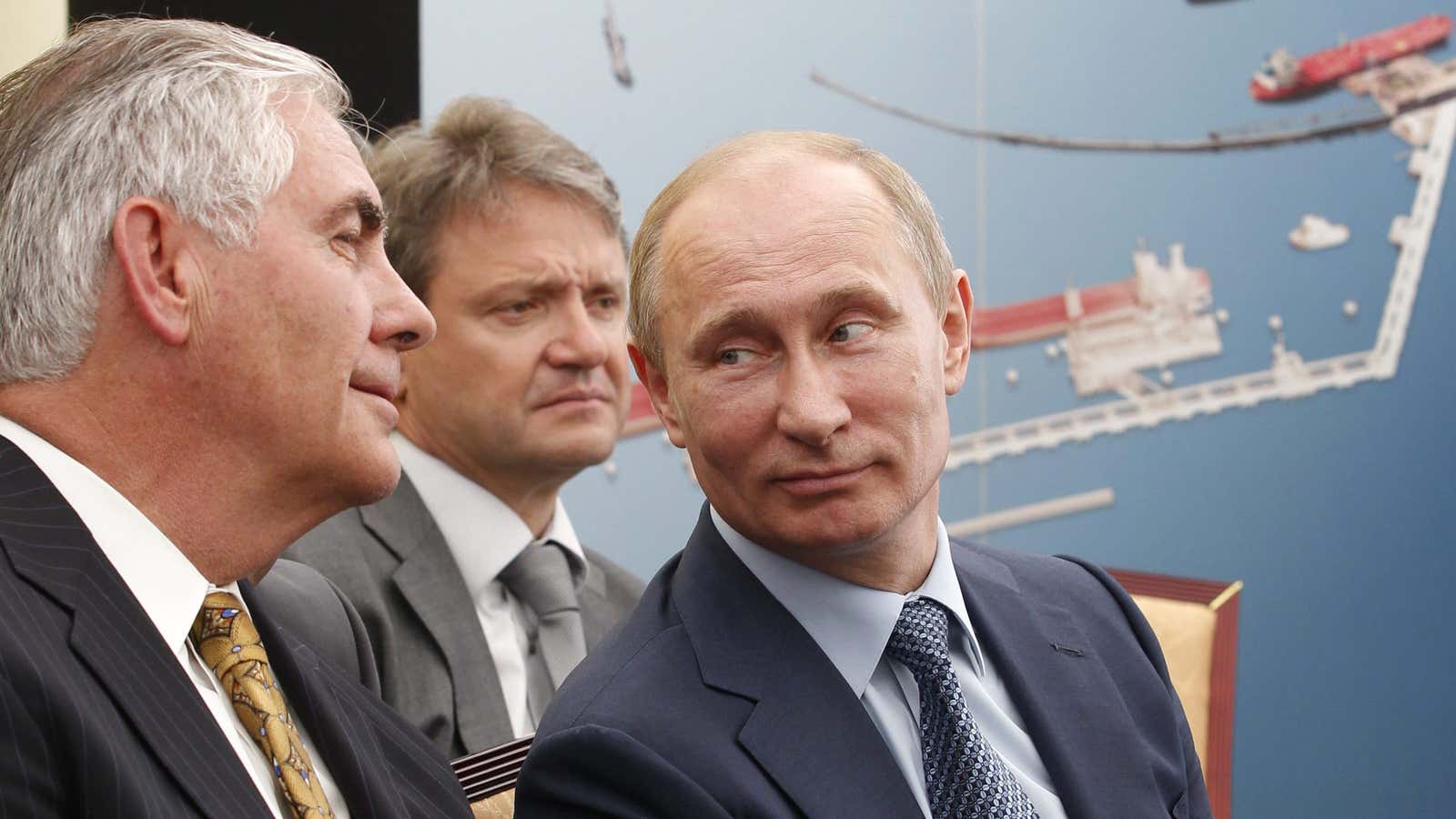Donald Trump is reportedly close to announcing ExxonMobil boss Rex Tillerson as his secretary of state—a wealthy oil titan with a long relationship with Russia and its president, Vladimir Putin.
The 64-year-old oilman, whose mandatory retirement from the company where he has spent 41 years has been expected because of his age, projects an image as cool and even-tempered. With him, Trump brings a pragmatic, stable and no-nonsense sensibility—and long, high-level experience making deals around the world—to the post of chief US diplomat.
Several news organizations have reported Tillerson’s imminent selection. But the Trump transition team’s communications director tweeted that there is nothing to announce as yet, and ExxonMobil declined comment.
As a chief of Big Oil, Tillerson has already dealt face to face with many of the world’s most important leaders. That includes Putin, who clearly admires Tillerson, probably to some extent because of ExxonMobil’s reputation as an uncompromising, take-no-prisoners tough guy—the same image that he (and Trump) likes to portray.
In the 2000s, Tillerson was ExxonMobil’s lead manager on Sakhalin I, a big natural gas field in Russia’s far east. That is when Tillerson formed his relationship with Putin. At ExxonMobil, Tillerson was known to challenge anyone presuming to better understand Russia, and some experts think he was right.
“He is probably the person in this country with the most experience living in Russia and managing that relationship and he of course also has a strong understanding of the Middle East,” said Amy Myers Jaffe, an oil expert at the University of California at Davis.
Tillerson fits the tenor of Trump’s appointments to date—predominantly retired generals and extremely wealthy business magnates. The pattern aligns with Trump’s promise to surround himself with seasoned negotiators who won’t let the US be pushed around, as he believes it has been. But it is hard to see where his cabinet will represent the working class, whose well-being he has also vowed to restore.
An Eagle Scout and a lifelong ExxonMobil employee who began as a production engineer, Tillerson became CEO in 2006, succeeding the hard-charging and abrasive Lee Raymond. If environmentalists would be infuriated by Tillerson’s appointment—and they already are—it is largely because of the actions of Raymond, not Tillerson. It is Raymond who funded scientists and organizations that methodically created doubt about climate science.
In 2009, two weeks before Barack Obama’s inauguration, and under the then-prevailing expectation of far-reaching climate-change law, Tillerson publicly reversed ExxonMobil’s policy and recognized climate change as an “important global issue.”
While pragmatic, Tillerson also has been bold, championing ExxonMobil interests even when they diverge from first-order US strategic policies, thus cementing the company’s reputation as a dark state-within-a-state.
In breakaway Iraqi Kurdistan, for example, the US opposed American oil companies signing independent deals without Baghdad’s permission. The concern was that Kurdistan might actually declare independence, thus weakening Baghdad, whose longevity Washington promoted at all costs. But in 2010 and 2011, Kurdish leaders were secretly wooing companies, and ExxonMobil became the first Big Oil company to sign with them, flouting both the US and Baghdad. So consequential was Tillerson’s decision that, given ExxonMobil’s heft and history, it single-handedly gave Kurdistan the image of an actual independent country.
And in 2014, the US imposed sanctions on Russia following its invasion of Ukraine. It did so just as ExxonMobil was drilling a well in Russia’s section of the Arctic Sea. Putin regards the Arctic as Russia’s strategic future because the region is believed to be rich with oil. But at the time, no well had actually been completed there, so it remained unproven. Putin was waiting for ExxonMobil to validate the potential of the Arctic with its well.
Technically speaking, ExxonMobil should have immediately abandoned the project when the sanctions were imposed, but Tillerson could have seriously aggravated Putin if he stopped drilling short of the reservoir. The company asked the US government for a two-week reprieve from the sanctions, saying it was a necessity if the well was to be safely sealed. While completing its work, it announced it had discovered up to 2.7 billion barrels of oil—which surely earned Putin’s gratitude. The impression was that ExxonMobil snookered Washington in order to favor Putin—and the company.
The question will be whether Trump can tolerate an exceedingly confident secretary of state who doesn’t appreciate acting out. But if he nominates Tillerson, Trump would soothe worries of some of the world after rattling them with erratically worded statements and tweets. In the same way that, 15 years ago, retired General Colin Powell gave the inexperienced president George W. Bush gravitas abroad as his first secretary of state, Tillerson would steady Trump’s operations with an image of seriousness—earned as chief of the biggest, scariest and most respected publicly traded non-state oil company in the world.
